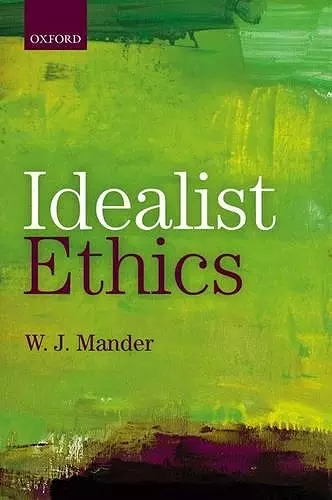Idealist Ethics
Format:Hardback
Publisher:Oxford University Press
Published:4th Feb '16
Should be back in stock very soon

W. J. Mander examines the nature of idealist ethics, that is to say, the form and content of ethical belief most typically adopted by philosophical idealists. While there exist many studies of the ethical views of individual idealist philosophers there has been no literature at all on the notion of idealist ethics per se. Never is it asked: at which points, if any, do the ethical systems of all these thinkers overlap, and what relation, if any, do such commonalities bear to their authors' idealism? Never is the question posed: were you suddenly to become convinced of the truth of some form of philosophical idealism what revisions, if any, would that necessitate in your conception of the truth, nature, and significance of ethical judgements? The inquiry has two aims. The first is historical. From the record of past philosophy, Mander demonstrates that there exists a discernible idealist approach to moral philosophy; a tradition of 'idealist ethics.' He examines its characteristic marks and varieties. The second aim is apologetic. Mander argues that such idealist ethics offers an attractive way of looking at moral questions and that it has much to contribute to contemporary discussion. In particular he argues that Idealist ethics have the power to cut through the sterile opposition between moral realism and moral anti-realism which has come to dominate contemporary thinking about ethical questions. To be an idealist is precisely to hold that the universe is so constituted that things are real if and only if they are ideal; to hold that uncovering in something the work of mind makes it more not less significant.
the book is highly readable. Mander writes knowledgeably about a great many canonical idealist thinkers, including Plato, Leibniz, Berkeley, Kant, Fichte, Hegel, Schopenhauer, Green, Bradley, Bosanquet, and Royce. One of the book's chief values is considering these philosophers in juxtaposition. Mander additionally seeks to regenerate interest in non-canonical figures who were prominent in their own day, such as Hermann Lotze (who, as Mander notes, has enjoyed some renewed interest through the efforts of Frederick Beiser) and John McTaggart (who is known for his work on time, but whose writings on ethics are ignored); and he aims further to generate interest in figures not read by contemporary philosophers, such as Edward Caird and Marietta Kies. * Jon Garthoff, Notre Dame Philosophical Reviews Online *
ISBN: 9780198748892
Dimensions: 241mm x 165mm x 21mm
Weight: 552g
288 pages